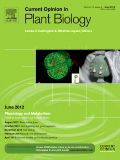
CURRENT OPINION IN PLANT BIOLOGY
Scope & Guideline
Pioneering Discussions in Plant Science Excellence
Introduction
Aims and Scopes
- Plant-Microbe Interactions:
Research in this area explores how plants interact with microbial communities, including beneficial symbionts and pathogens, focusing on the molecular mechanisms and signaling pathways involved. - Specialized Metabolism:
The journal emphasizes studies on specialized metabolites produced by plants, including their biosynthesis, regulation, and ecological roles in plant defense and interactions with other organisms. - Cellular and Molecular Mechanisms:
This encompasses research on cellular processes such as cell division, differentiation, and signaling pathways that govern plant development and responses to environmental stimuli. - Epigenetics and Gene Regulation:
There is a strong focus on the role of epigenetic mechanisms in regulating gene expression, particularly in response to biotic and abiotic stresses, and their implications for plant development. - Plant Development and Morphogenesis:
The journal covers various aspects of plant development, including organogenesis, root and shoot architecture, and the interplay between genetic and environmental factors. - Plant Immunity:
Research on plant immunity addresses how plants defend themselves against pathogens, studying the evolution of resistance mechanisms and the roles of immune receptors.
Trending and Emerging
- CRISPR and Genome Editing:
The use of CRISPR technology and other genome editing techniques is rapidly emerging, allowing for precise modifications in plant genomes, which is crucial for developing resilient crops and improving agricultural practices. - Microbiome Research:
There is a growing interest in understanding plant-associated microbiomes and their impact on plant health, growth, and stress responses, emphasizing the importance of these interactions in sustainable agriculture. - Integrative Omics Approaches:
The integration of genomics, transcriptomics, proteomics, and metabolomics is on the rise, enabling comprehensive insights into plant biology and facilitating the understanding of complex traits and interactions. - Plant Stress Responses:
Research focused on how plants respond to abiotic and biotic stresses, particularly under climate change conditions, is increasingly relevant, reflecting the urgent need to develop resilient plant varieties. - Synthetic Biology in Plant Research:
The application of synthetic biology to engineer plants for enhanced traits, such as improved nutritional value or stress tolerance, is emerging as a crucial area of research with significant implications for agriculture.
Declining or Waning
- Traditional Breeding Techniques:
Research focused on traditional breeding methods is becoming less prominent as newer biotechnological approaches, including genome editing and synthetic biology, gain traction and demonstrate greater efficacy. - Basic Plant Physiology:
Studies that concentrate solely on basic physiological processes without integrating molecular or genetic perspectives are seeing less publication interest, as the field moves towards more integrative and applied research. - Conventional Plant Pathology:
While plant pathology remains relevant, there is a noticeable decline in studies that do not incorporate modern molecular techniques or interdisciplinary approaches, leading to a reduced focus on classical methods.
Similar Journals

Journal of Integrative Plant Biology
Unveiling the Complexities of Plant LifeThe Journal of Integrative Plant Biology, published by WILEY, is a premier academic journal that has been at the forefront of advancing research in plant biology since its inception in 2005. With a notable impact factor and a robust Scopus ranking—positioned at #7 out of 516 in Plant Science and #18 out of 438 in Biochemistry—this journal is recognized as a Q1 journal in multiple categories, including Biochemistry and Plant Science. The journal aims to bridge the gaps between various disciplines in plant research, emphasizing integrative and interdisciplinary approaches to understanding plant biology. With options for open access, the Journal of Integrative Plant Biology ensures broad visibility and impact of research findings, making it an invaluable resource for researchers, professionals, and students looking to stay informed on innovative advancements in the field. Its headquarters are located in the United Kingdom, further amplifying its reach within the global academic community.
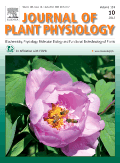
JOURNAL OF PLANT PHYSIOLOGY
Innovating Insights for Sustainable AgricultureJOURNAL OF PLANT PHYSIOLOGY, published by ELSEVIER GMBH, stands as a leading international journal dedicated to the field of plant physiology, agronomy, and crop science. With an impressive impact factor and recognition within the Q1 and Q2 quartiles across various categories, this journal consistently ranks among the top in its field—positioned at #65/516 in Plant Science and #52/406 in Agronomy and Crop Science as of 2023. Located in Munich, Germany, it serves as a vital platform for researchers, practitioners, and students to share groundbreaking insights and advancements. Although it does not currently offer open access, the journal provides an essential repository of knowledge, publishing significant original research, reviews, and discussions on plant function, regulation, and development, thereby shaping the future of agricultural practices and contributing to our understanding of biophysical processes. Researchers looking to publish in a reputable venue or to access cutting-edge studies will find JOURNAL OF PLANT PHYSIOLOGY an invaluable resource.
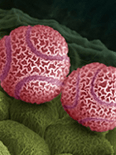
Annual Review of Plant Biology
Elevating Understanding of Plant Biology TrendsThe Annual Review of Plant Biology, published by Annual Reviews, stands as a premier academic journal dedicated to the comprehensive coverage of significant developments in the field of plant biology. With an impactful presence in the United States and a stellar reputation reflected in its Q1 rankings across multiple categories including Cell Biology, Molecular Biology, Physiology, and Plant Science, this journal consistently ranks among the top within its domain. The journal is particularly esteemed for its synthesis of the latest research findings, making it an invaluable resource for researchers, professionals, and students seeking in-depth insights and advancements in plant biology. Though it does not offer open access, the Annual Review of Plant Biology is essential for those committed to exploring the intricate mechanisms underlying plant function and development, with coverage spanning from 1996 to 2024. As the field continues to evolve, this journal will undoubtedly remain at the forefront, driving innovation and fostering a deeper understanding of plant sciences.

Nature Plants
Elevating Understanding of Plants and Their ImpactNature Plants is a premier journal dedicated to the dynamic and interdisciplinary field of plant science, published by NATURE PORTFOLIO in the United Kingdom. With an impressive impact factor placing it in the top tier of scholarly journals—ranking Q1 in Plant Science for 2023—this journal sets a high standard for research dissemination. Nature Plants has maintained a remarkable Scopus Rank of 5 out of 516 in the Agricultural and Biological Sciences category, reflecting its pivotal role in advancing knowledge in the field. The journal aims to provide a platform for groundbreaking research that addresses key challenges in plant biology, ecology, and agriculture, thereby fostering a deeper understanding of plant science's contribution to global sustainability. Although primarily non-open access, it offers exclusive insights and robust discussions, making it an indispensable resource for researchers, professionals, and students eager to explore the latest advancements and innovations in plant science.
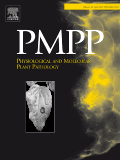
PHYSIOLOGICAL AND MOLECULAR PLANT PATHOLOGY
Empowering researchers to combat plant diseases effectively.Physiological and Molecular Plant Pathology is a leading journal published by Academic Press Ltd - Elsevier Science Ltd, dedicated to advancing our understanding of plant diseases through the synthesis of physiological and molecular perspectives. With an ISSN of 0885-5765, this esteemed journal has been a cornerstone in the field since its inception in 1986 and continues to publish critical research findings up to 2024. Notably, it holds a strong reputation in Plant Science, ranked Q2, and genetics, ranked Q3, reflecting its impactful contributions to these important areas of study. The journal is recognized within Scopus, achieving a ranking of 151 out of 516 in Plant Science, positioning it within the 70th percentile, making it a vital resource for researchers and students alike. While it is not an open-access journal, the insights provided in each issue are invaluable for those dedicated to understanding the complexities of plant pathology and enhancing agricultural resilience. Researchers, professionals, and students in the field are encouraged to explore and contribute to this pivotal journal, which plays a crucial role in driving innovation and discovery in plant health sciences.

Molecular Horticulture
Transforming Agronomy with Cutting-Edge ResearchMolecular Horticulture is a prestigious journal published by SpringerNature, dedicated to advancing knowledge in the fields of Agronomy, Crop Science, Horticulture, and Molecular Biology. Based in the United Kingdom, this journal, with ISSN 2730-9401, is recognized for its high-quality, peer-reviewed research and has rapidly established itself within the academic community, achieving a remarkable Q1 ranking across its relevant categories as of 2023. With a strong focus on innovative research that explores the intersection of molecular biology and horticultural science, Molecular Horticulture provides valuable insights that are essential for researchers and professionals aiming to enhance crop production and sustainability practices. As part of the Scopus database, the journal ranks impressively within its fields, holding notable positions such as Rank #7 in Horticulture and Rank #42 in Agronomy and Crop Science. While currently published through traditional access models, the journal remains accessible to a wide audience of scientists, educators, and students eager to stay informed on the latest discoveries and trends in plant science.
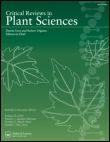
CRITICAL REVIEWS IN PLANT SCIENCES
Fostering innovation through rigorous peer review.CRITICAL REVIEWS IN PLANT SCIENCES, published by Taylor & Francis Inc, is a prestigious journal that has been advancing the field of plant science since its inception in 1983. With an impressive impact factor and consistently ranked in the top quartile (Q1) of its category, this journal is a leading platform for the dissemination of peer-reviewed research that spans the breadth of plant biology, ecology, and agricultural applications. Housed in the United Kingdom, it serves an international readership, making significant contributions to our understanding of plant systems and their environmental interactions. This journal is highly regarded within the Scopus rankings, holding an impressive position of 18 out of 516 journals in the Agriculture and Biological Sciences category, placing it in the 96th percentile. Although not currently open access, the journal provides valuable insights and critical reviews that are essential for researchers, professionals, and students striving to further their knowledge and bolster their own research in plant sciences.

PROTOPLASMA
Advancing the Frontiers of Cell and Plant SciencePROTOPLASMA is a prestigious academic journal published by Springer Wien, dedicated to advancing knowledge in the fields of Cell Biology, Plant Science, and related areas of Medicine. Established in 1926 and continuing through 2024, this journal boasts a rich history of scholarly contributions and is currently indexed with a notable ranking in various disciplines: it stands in the top quartile (Q1) in Plant Science, the second quartile (Q2) in miscellaneous Medicine, and the third quartile (Q3) in Cell Biology as of 2023. With robust Scopus rankings placing it in the 86th percentile in Plant Science and a solid position in Cell Biology, PROTOPLASMA is recognized for its commitment to high-quality research and innovative findings. Although the journal does not offer open access options, it remains a valuable resource for researchers, professionals, and students seeking to explore the cellular and molecular underpinnings of plant life and its implications in broader biological contexts. Based in Austria, PROTOPLASMA serves as a vital forum for disseminating pioneering research that shapes the future of scientific inquiry in its respective fields.
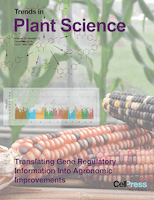
TRENDS IN PLANT SCIENCE
Fostering Interdisciplinary Dialogue in Plant ResearchTRENDS IN PLANT SCIENCE is a premier academic journal published by CELL PRESS, dedicated to advancing the field of plant sciences. With an ISSN of 1360-1385 and E-ISSN 1878-4372, this journal has established itself as a critical resource for researchers and practitioners alike, boasting a remarkable impact factor that places it in the Q1 quartile for plant science in the 2023 rankings. Featuring a comprehensive scope that encompasses emerging trends, innovative research, and pivotal reviews in the plant sciences, it aims to promote interdisciplinary dialogue and encourage progressive research methodologies. Hailing from the United Kingdom, TRENDS IN PLANT SCIENCE serves a global community of over 516 journals, achieving a top-tier ranking of 3rd in the Scopus ranking for Agricultural and Biological Sciences. This makes the journal an indispensable asset for anyone aiming to keep abreast of the latest developments in plant biology and its applications. As we look towards its future converging years from 1996 to 2024, the journal continues to foster scholarly excellence and innovation in the field.
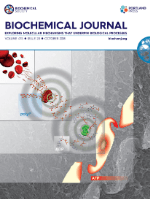
BIOCHEMICAL JOURNAL
Connecting Ideas, Inspiring Discoveries in BiochemistryBIOCHEMICAL JOURNAL, published by Portland Press Ltd, stands as a leading publication in the fields of Biochemistry, Cell Biology, and Molecular Biology, reflecting a commitment to advancing scientific knowledge since its inception in 1945. With a distinguished Q1 ranking across these categories and impressive Scopus rankings, the journal serves as an invaluable resource for researchers, professionals, and students alike, facilitating critical discoveries and innovative research practices. Although not currently offering open access, the journal provides a platform for high-quality peer-reviewed articles, ensuring rigorous standards in the dissemination of biochemical research. Spanning over seven decades and continuing through to 2024, the BIOCHEMICAL JOURNAL fosters an environment where cutting-edge biochemical research thrives, supporting the global scientific community's efforts to address complex biological questions and enhance our understanding of fundamental cellular processes.